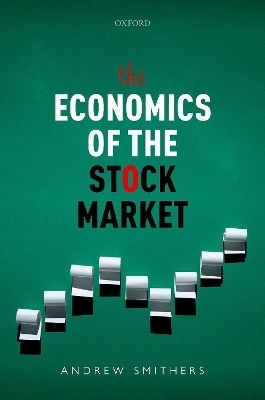
The Economics of the Stock Market
Oxford University Press (Verlag)
978-0-19-284709-6 (ISBN)
The current consensus economic model, the neoclassical synthesis, depends on aprioristic assumptions that are shown to be invalid when tested against the data and fails to include finance. Economic policy based on this consensus has led to the financial crisis of 2008, the 'Great Recession' that followed, and the slow subsequent rate of growth. In The Economics of the Stock Market, Andrew Smithers proposes a model that is robust when tested, and by including the impact of the stock market on the economy, overcomes both these defects. The faults of the current consensus model are shown to result typically from an unscientific methodology in which assumptions are held to be valid despite their incompatibility with data evidence. Smithers demonstrates examples of these faults: the Miller/Modigliani Theorem (the assumption that leverage does not affect the value of produced capital assets); the assumption that short-term and long-term interest rates, and the cost of equity capital, are co-determined; and the assumption that the decisions of corporate managements aim to maximise the present value of corporate assets ('profit maximisation') rather than the value determined by the stock market. The Economics of the Stock Market proposes a model that includes and explains the stationarity of real returns on equity, based on the interaction of the differing utility preferences of the managers of companies and the owners of financial capital. These claims are highly controversial, and Smithers proposes that the relative merits of the neoclassical synthesis and this proposed alternative can only be properly considered through public debate.
Andrew Smithers is founder and director of economic consultancy Smithers & Co. He is the author of The Road to Recovery: How and Why Economic Policy Must Change (Wiley, 2013), and Productivity and the Bonus Culture (OUP, 2018).
Foreword by Andy Haldane
1: Introduction
2: Surprising Features of the Model
3: The Model in Summary
4: Management Behaviour, Investment, Debt, and Pay-out Ratios
5: Corporate Leverage and Household Portfolio Preference
6: The Growth of Corporate Equity
7: The Yield Curve
8: The Risk-Free Short-term Rate of Interest
9: Equity, Bond, and Cash Relative Returns
10: Stock Market Returns Do Not Follow a Random Walk
11: The Risks of Equities at Different Time Horizons
12: The Time Horizon at Which Investors Will Prefer Equities to Bonds
13: Changes in Aggregate Risk Aversion
14: Monetary Policy, Leverage, and Portfolio Preferences
15: Valuing the US Stock Market
16: The Real Return on Equity Capital Worldwide
17: Money and Time Weighted Returns
18: The Behaviour of The Firm
19: Corporate Investment and the Miller-Modigliani Theorem
20: Land, Inventories, and Trade Credit
21: How the Market Returns to Fair Value
22: Fluctuations in the Hurdle Rate
23: Tangibles and Intangibles
24: Other Problems from Labelling IP Expenditure as Investment
25: Inflation, Leverage, Growth, and Financial Stability.
26: Tax
27: Portfolio Preference and Retirement Savings
28: Life Cycle Savings Hypothesis (LCSH)
29: Depreciation, Capital Consumption, and Maintenance
30: Comparison with Other Approaches
31: The Efficient Market Hypothesis
32: Summary
33: Comments in Conclusion
Appendices
Appendix 1. The Duration of Bonds and Equities
Appendix 2. The Valuation of Unquoted Companies in The Financial Accounts of the United States - Z1
Appendix 3. Measurement of the Net Capital Stock and Depreciation in the US
Appendix 4. Data Sources, Use, and Methods of Calculation
| Erscheinungsdatum | 23.03.2022 |
|---|---|
| Verlagsort | Oxford |
| Sprache | englisch |
| Maße | 164 x 241 mm |
| Gewicht | 480 g |
| Themenwelt | Geschichte ► Teilgebiete der Geschichte ► Wirtschaftsgeschichte |
| Wirtschaft ► Betriebswirtschaft / Management ► Finanzierung | |
| Wirtschaft ► Volkswirtschaftslehre ► Finanzwissenschaft | |
| ISBN-10 | 0-19-284709-0 / 0192847090 |
| ISBN-13 | 978-0-19-284709-6 / 9780192847096 |
| Zustand | Neuware |
| Haben Sie eine Frage zum Produkt? |
aus dem Bereich


